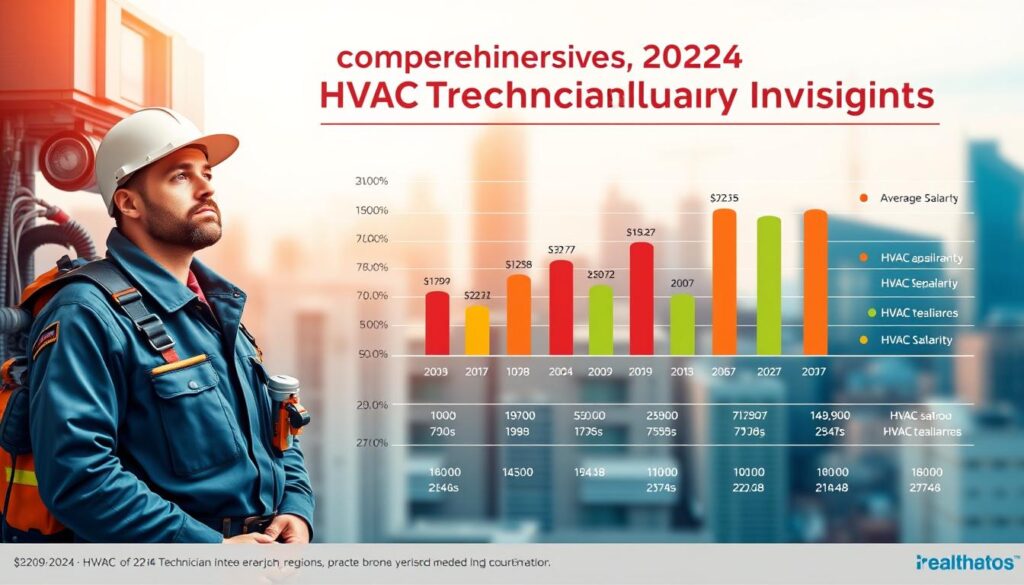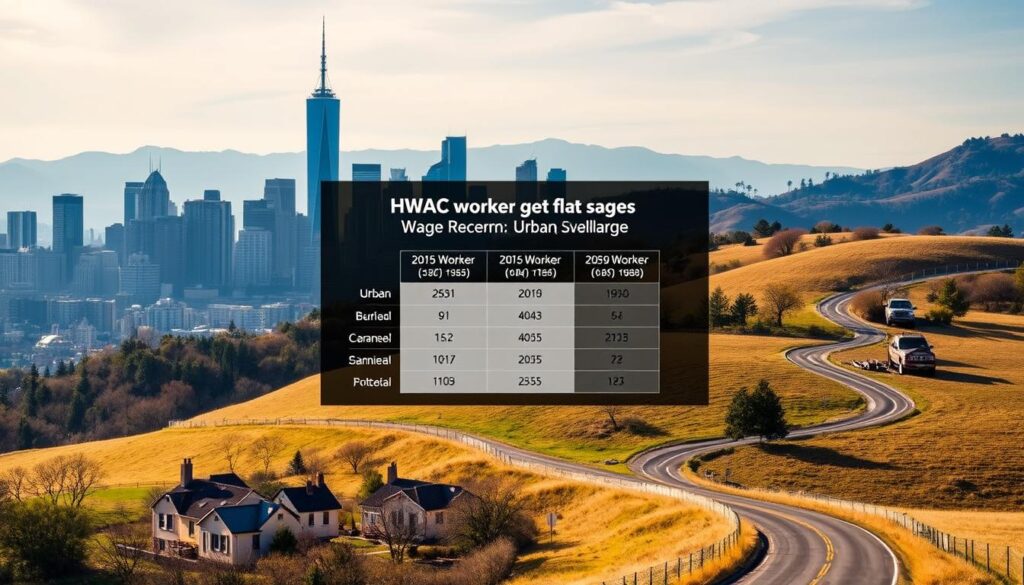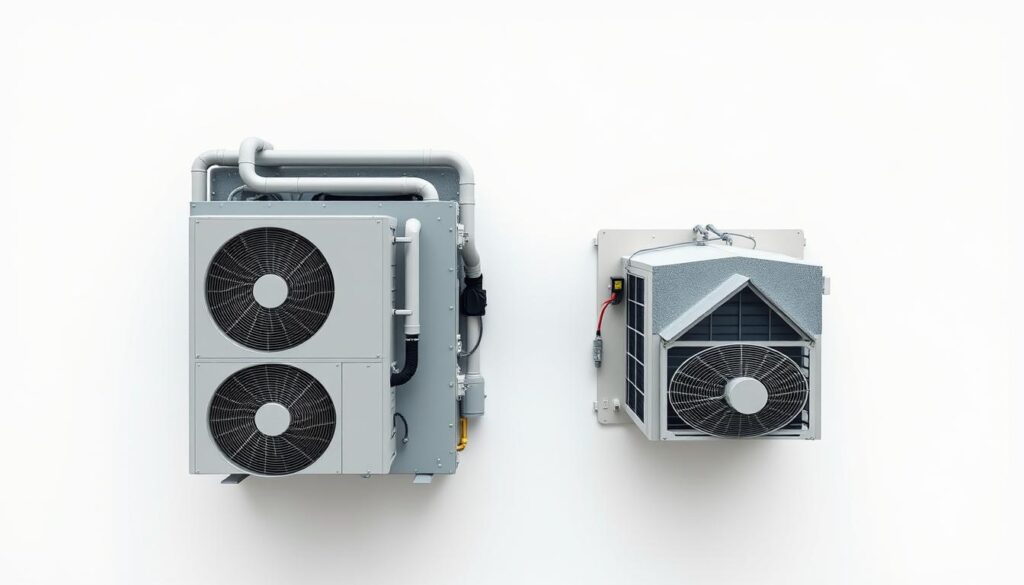Affiliate Disclosure
HVAC Guide Guys is a participant in the Amazon Services LLC Associates Program, an affiliate advertising program designed to provide a means for sites to earn advertising fees by advertising and linking to Amazon.
How Much Do HVAC People Get Paid? Ever thought about why some HVAC techs make a lot more than others? It’s not just about the numbers. It’s about the hidden factors that affect salaries in 2024.

The world of HVAC technician salaries is complex. They can earn between $49,500 and $54,100 a year. This shows that their pay depends on their skills, experience, and what they specialize in.
Let’s dive into the world of HVAC pay. We’ll look at what affects how much HVAC pros earn. This will help you understand your career or make smart hiring choices.
Key Takeaways
- Average HVAC technician salaries range from $49,500 to $54,100 annually
- Compensation varies based on experience, location, and specialization
- Certification and advanced skills can significantly boost earning
- Regional differences play a big role in HVAC technician pay
- Career advancement opportunities directly impact salary growth
Table of Contents
Understanding HVAC Industry Salary Trends
The HVAC industry is changing fast, affecting hvac installer wages and service pay rates. New technology and environmental concerns are opening up better job chances.
The Bureau of Labor Statistics says HVAC jobs will grow a lot. They predict 40,100 new jobs by 2033. This is great news for those in or thinking about the HVAC field.
Current Market Landscape
Your salary in HVAC depends on a few key things:
- Where you live
- Your special skills
- How long you’ve been working
- Your certifications
Key Wage Influencing Factors
HVAC pay changes for different reasons. Technicians with extra skills and certifications earn more. Cities usually pay more than rural areas.
Industry Growth Projections
The need for skilled HVAC workers keeps going up. Green technology and energy-saving systems are making the market bigger. This means more chances for career growth and higher pay.
Investing in continuous learning and skill development can significantly boost your HVAC career trajectory.
Explore Our HVAC Shop
Looking for top-rated HVAC tools, parts, and accessories? Visit our shop and find the perfect solution for your needs.
Visit the ShopNational Average HVAC Technician Salaries
Knowing how much HVAC contractors make is key in the heating, ventilation, and air conditioning field. The Bureau of Labor Statistics says HVAC technicians made a median of $51,390 in May 2022. This gives a good starting point for understanding hvac professional income in the U.S.
Your earnings can change a lot based on a few important things:
- Where you work
- How long you’ve been working
- What you specialize in
- Your certifications
Starting HVAC technicians usually earn about $35,000 a year. Those in the middle of their careers can make between $45,000 and $65,000. The best in the field, with advanced skills and specializations, can earn up to $80,000 or more.
The HVAC field pays well compared to many other skilled trades. Your earnings can grow with:
- Better technical skills
- More certifications
- Expertise in complex systems
- Being ready to work in tough places
Remember, hvac contractor earnings aren’t just about the base salary. Many make extra money through overtime, emergency calls, and more maintenance contracts.
Experience-Based Pay Scale Breakdown
Your HVAC career pay depends a lot on your experience. As you move up in your career, your salary will show your growing skills. Knowing these pay scales helps you plan your career and set income goals.
The HVAC field offers chances for financial growth as you gain experience. Let’s look at how your earnings can grow over your career:
Entry-Level Positions (0-2 years)
At the start of your HVAC career, your pay reflects your basic skills and training. Entry-level jobs usually have:
- Annual salary range: $45,000 – $54,100
- Learning basic technical skills
- Working under supervision
- Little independent project work
Intermediate Roles (2-4 years)
With more experience, your pay goes up. Intermediate technicians see:
- Annual salary range: $55,000 – $65,700
- More freedom in projects
- Dealing with complex tasks
- Opportunities for special training
Senior Positions (4-7 years)
Experienced HVAC pros earn more due to their wide range of skills. Senior technicians can look forward to:
- Annual salary range: $67,000 – $77,200
- Leadership roles
- Advanced problem-solving
- Chance to mentor others
Tip: Keep improving your skills and get certifications to move up faster in the HVAC field.
Explore Our HVAC Shop
Looking for top-rated HVAC tools, parts, and accessories? Visit our shop and find the perfect solution for your needs.
Visit the ShopTop-Paying States for HVAC Professionals
Some states pay HVAC specialists more than others. Where you work can greatly affect how much you earn. This is because different places have different needs and pay differently.
California is at the top for HVAC pay. It has a lot of tech and building projects. This means HVAC experts there get paid very well.
- California: Highest average HVAC specialist pay in the United States
- Nevada: Competitive wages due to extensive commercial and residential development
- New York: Strong urban infrastructure drives premium compensation
How much you can earn in HVAC changes a lot by state. Several things affect this:
- Local cost of living
- Regional economic conditions
- Construction and infrastructure development
- Climate-specific HVAC requirements
Pro tip: Consider relocating to high-paying states to maximize your HVAC career earnings.
Strategic career planning can help you leverage geographical salary differences in the HVAC trade.
How Much Do HVAC People Get Paid in Different Regions
Understanding how much HVAC technicians make in different areas is key to making good career choices. Salaries for HVAC workers vary a lot across the United States. This is because of local economic conditions, demand, and the cost of living.
Looking into HVAC salaries, you’ll see clear patterns in pay across major regions. Each area offers different chances and salary levels that can affect your earnings.
West Coast Compensation Insights
The West Coast has some of the highest HVAC technician salaries. States like California and Washington pay well because of:
- High tech industry presence
- Complex climate control needs
- Robust construction markets
East Coast Earnings Overview
East Coast HVAC workers have varied salaries. Big cities like New York and Boston often pay more than smaller areas. The salary in these places is influenced by:
- Population density
- Commercial and residential development
- Seasonal climate demands
Midwest Salary Landscape
Midwest HVAC technicians might earn a bit less than those on the coast. Rural and suburban areas often provide steady work with competitive compensation packages. Factors affecting Midwest HVAC wages include:
- Agricultural and manufacturing infrastructure
- Seasonal temperature extremes
- Lower cost of living
Your earnings will depend on your experience, specialization, and local market conditions. Knowing regional salary trends can help you plan your HVAC career.
Explore Our HVAC Shop
Looking for top-rated HVAC tools, parts, and accessories? Visit our shop and find the perfect solution for your needs.
Visit the ShopUrban vs Rural HVAC Compensation Differences

Location is key when looking at hvac installer wages. Urban and rural areas have different pay levels for HVAC workers.
Urban areas usually pay more for HVAC services. This is because of several reasons:
- Higher population density
- More complex infrastructure
- Greater demand for specialized services
- Increased cost of living
In big cities like New York, Chicago, and San Francisco, HVAC techs earn more. Their wages can be 20-30% higher than in rural areas.
“Location isn’t just about geography—it’s about economic opportunity in the HVAC industry.” – HVAC Industry Expert
Rural HVAC workers face unique challenges. While they might earn less, they also get:
- Lower living expenses
- Less competitive job markets
- Potential for stronger community relationships
- More consistent work with local residential and agricultural clients
When planning your HVAC career, think about more than just salary. Consider the whole economic scene of your work area.
Career Advancement and Salary Growth Opportunities
The HVAC industry offers exciting pathways for career development and increased income. Your ability to grow and advance depends on strategic skill building and professional positioning.
Advancing in the HVAC field requires a combination of technical expertise, continuous learning, and strategic career planning. Smart technicians understand that their earning can go beyond basic repair work.
Certification Impact on Earnings
Professional certifications can significantly boost your earnings. Key certifications that enhance your market value include:
- EPA Section 608 Certification
- NATE (North American Technician Excellence) Certification
- HVAC Excellence Professional Level Certification
Technicians with advanced certifications typically earn 10-20% more than non-certified peers. These credentials show your commitment to professional development and technical mastery.
Specialization Benefits
Specializing in specific HVAC domains can dramatically increase your income. Consider focusing on:
- Commercial HVAC systems
- Green technology installations
- Industrial refrigeration
- Smart home climate control systems
Pro tip: Technicians who develop expertise in cutting-edge technologies like energy-efficient systems and IoT-connected HVAC solutions can command premium rates.
By strategically investing in your skills and pursuing targeted certifications, you can transform your HVAC career. It can become a lucrative, long-term professional journey.
Explore Our HVAC Shop
Looking for top-rated HVAC tools, parts, and accessories? Visit our shop and find the perfect solution for your needs.
Visit the ShopBenefits and Additional Compensation
When looking at hvac career compensation, it’s important to remember that salary is just part of it. A good benefits package can really boost your overall earnings and job happiness.
Top HVAC employers offer more than just wages. Their packages can greatly improve your financial health and job security.
- Health Insurance: You get full medical, dental, and vision coverage.
- Retirement Plans: There’s a 401(k) plan with employer matching.
- Paid Time Off: You get vacation, sick, and personal days.
- Tool Allowances: You get money back for professional tools.
- Performance Bonuses: You can earn extra for doing a great job.
Pro Tip: Don’t just look at the base salary when comparing jobs. The whole package can add thousands to your yearly income.
“In the HVAC industry, a strong benefits package can be as valuable as your hourly rate” – HVAC Industry Expert
Many HVAC companies also offer extra perks. These make the job even more appealing. Some examples include:
- Fuel discounts for company vehicles
- Support for continuing education
- Health and wellness programs
- Life and disability insurance
Your total compensation is more than just your base pay. Knowing all the benefits helps you make better career choices in HVAC.
Commercial vs Residential HVAC Pay Rates
When looking at hvac specialist pay, it’s key to know the difference between commercial and residential work. Your career path can greatly affect your earnings. The HVAC trade earnings vary a lot based on the sector you choose.

Commercial HVAC work usually pays more because of the bigger and more complex projects. These jobs require advanced technical skills to handle the complex systems.
Project Size and Earnings
The size of projects affects how much you can earn. Commercial HVAC jobs often have:
- Larger infrastructure installations
- More sophisticated climate control systems
- Extended project timelines
- Higher budget allocations
Specialization Requirements
To earn more in commercial settings, you need specialized training. Key areas include:
- Industrial refrigeration systems
- Advanced control technologies
- Energy efficiency optimization
- Complex building management systems
Residential HVAC work is steady but pays less than commercial projects. Your earnings can go up with specialized certifications and advanced knowledge.
Industry Demand and Job Security
The HVAC industry is growing fast, opening up great jobs for those curious about HVAC pay. Experts say the job market for HVAC techs is strong and full of chances for advancement.
Experts point to several reasons for the HVAC sector’s growth:
- Increasing energy efficiency needs
- More homes and businesses being built
- New tech in climate control systems
- More demand for green heating and cooling
Looking at HVAC technician salaries, job security is key. The Bureau of Labor Statistics says the field will grow by 5% each year. This means about 46,000 new HVAC jobs by 2028. This steady growth makes for a stable and rewarding career for skilled workers.
“The HVAC industry offers more than just a job – it provides a sustainable career with continuous opportunities for advancement.” – HVAC Industry Analyst
Your salary in this field depends on demand. Having special skills, certifications, and knowledge of new tech can really increase your salary and job prospects.
Places with harsh weather and fast city growth need more HVAC workers. This creates more chances for good pay and career growth.
Explore Our HVAC Shop
Looking for top-rated HVAC tools, parts, and accessories? Visit our shop and find the perfect solution for your needs.
Visit the ShopEducation Requirements and Salary Correlation
Your education can greatly affect how much you earn as an HVAC installer. About 77% of HVAC techs have special certifications or associate’s degrees. These help them earn more in the field.
It’s key to know how education ties to your pay in HVAC. Different levels of education lead to different salary ranges:
- High School Diploma: Basic entry-level jobs
- Technical Certificate: Better pay
- Associate’s Degree: Higher starting salaries
- Advanced Certifications: Top pay
“Education is the cornerstone of success in the HVAC industry” – National HVAC Training Association
Getting specialized training in Refrigeration, Air Conditioning, Heating, and Gas Technology boosts your job chances. Also, ongoing education usually leads to:
- 15-25% salary boosts
- Better job opportunities
- Improved technical skills
| Education Level | Average Annual Salary | Career Advancement |
|---|---|---|
| High School Diploma | $35,000 – $42,000 | Limited |
| Technical Certificate | $45,000 – $55,000 | Moderate |
| Associate’s Degree | $50,000 – $65,000 | High |
| Advanced Certifications | $60,000 – $75,000 | Excellent |
Investing in education can change your HVAC career path and increase your earnings.
Conclusion
The HVAC industry offers great chances for a stable and well-paying career. Starting salaries for technicians can be around $37,410, while experienced contractors can earn over $71,420 a year. With the right career moves, you can earn even more.
Getting better at your job through certifications and focusing on areas with high demand can increase your earnings. The best professionals use their technical skills, sales abilities, and ongoing learning to make more money. Where you work, the type of projects you do, and your specialization all affect your salary.
Your future in HVAC looks bright. The need for better climate control, energy-saving systems, and skilled workers is growing. By improving your education, keeping up with new tech, and building a strong network, you can have a fulfilling and profitable career.
Whether you’re new to the field or looking to move up, HVAC offers many chances for a stable and rewarding career. Your dedication to learning and being adaptable will help you earn well and succeed in the long run.

